2020年外研版英语中考一轮教材复习课件七下 Modules 10-12
文档属性
| 名称 | 2020年外研版英语中考一轮教材复习课件七下 Modules 10-12 | 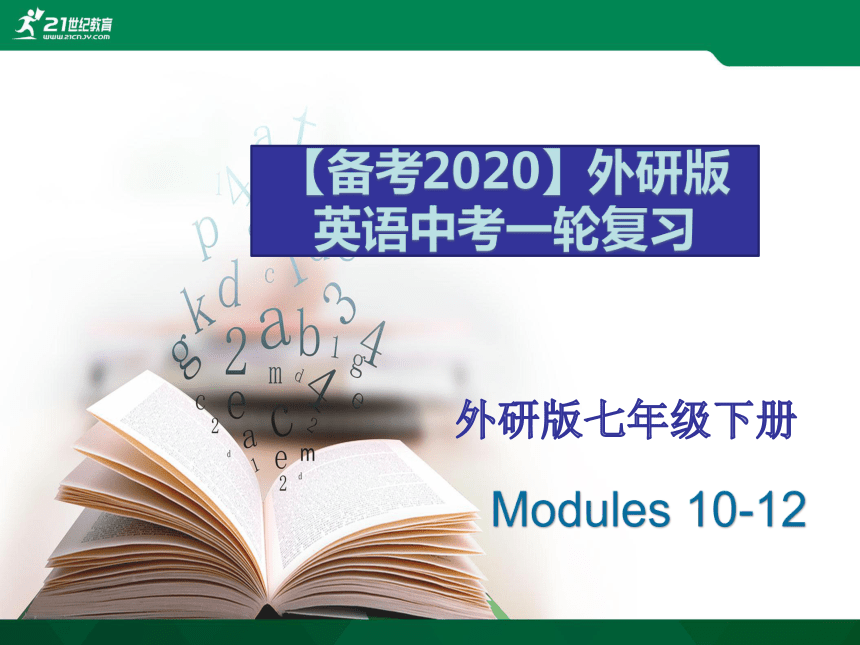 | |
| 格式 | zip | ||
| 文件大小 | 2.5MB | ||
| 资源类型 | 试卷 | ||
| 版本资源 | 外研版 | ||
| 科目 | 英语 | ||
| 更新时间 | 2020-01-16 10:09:39 | ||
图片预览

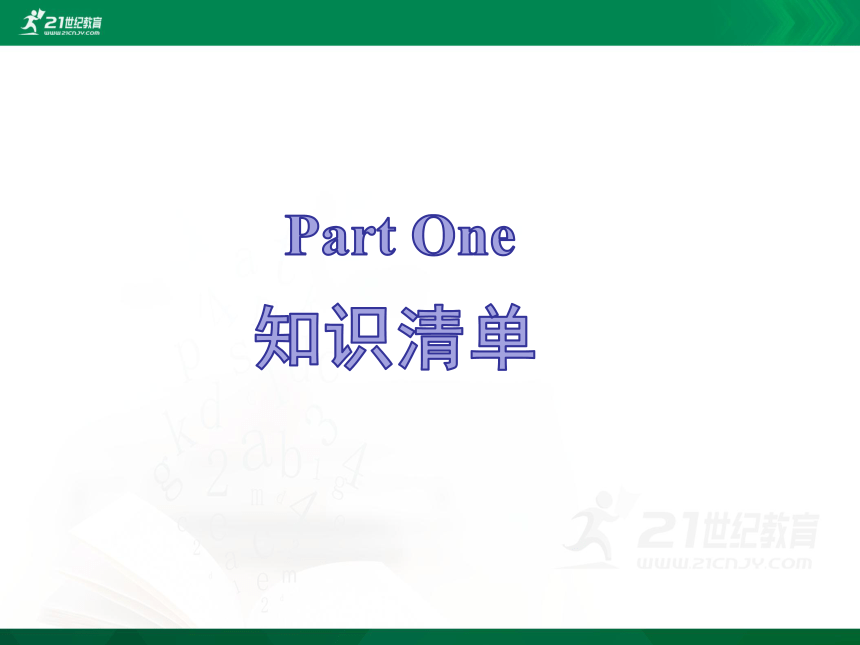
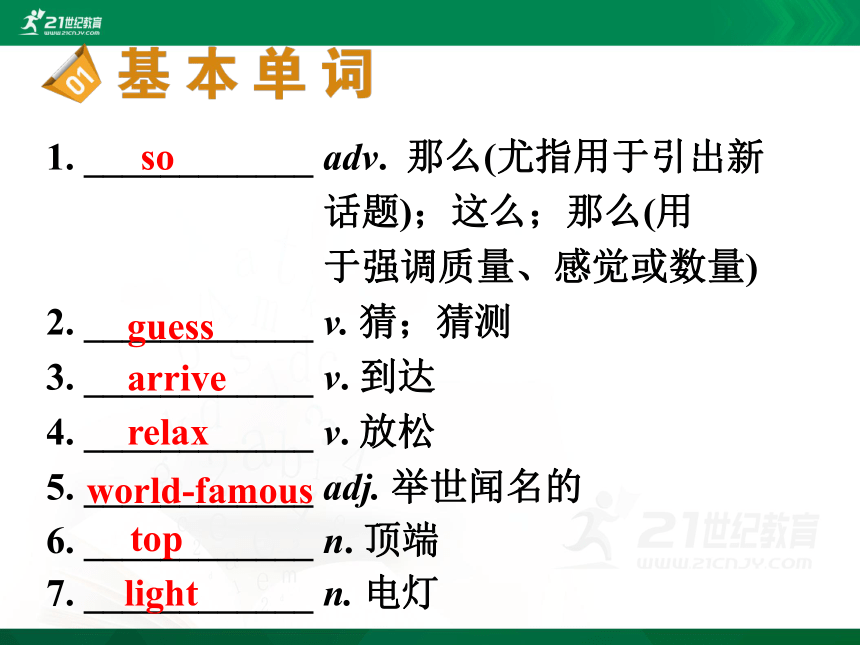
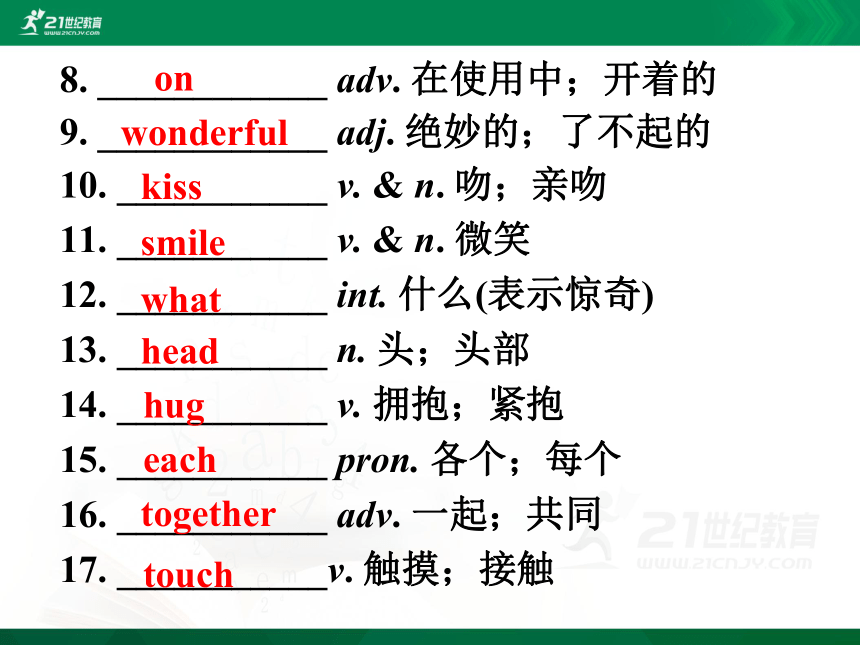
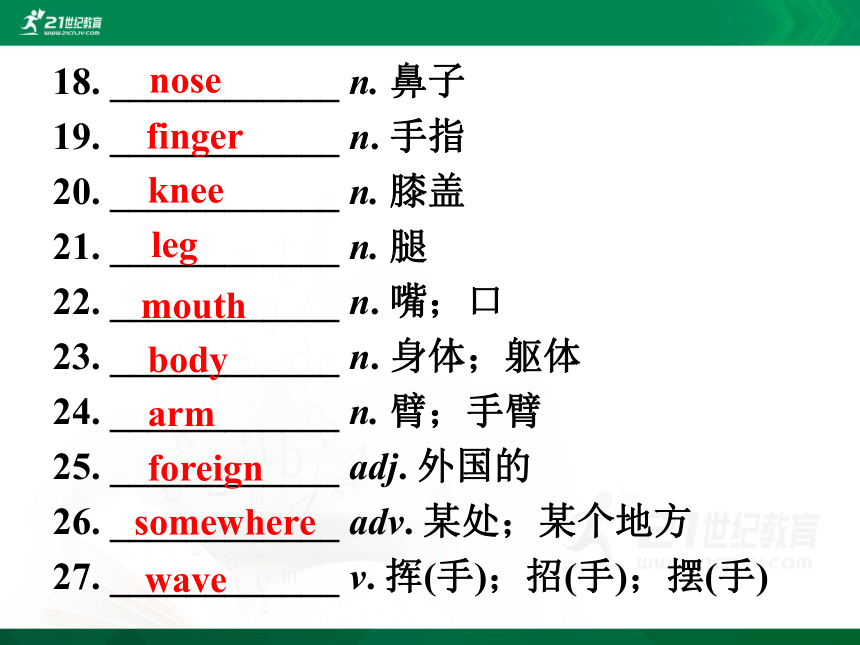
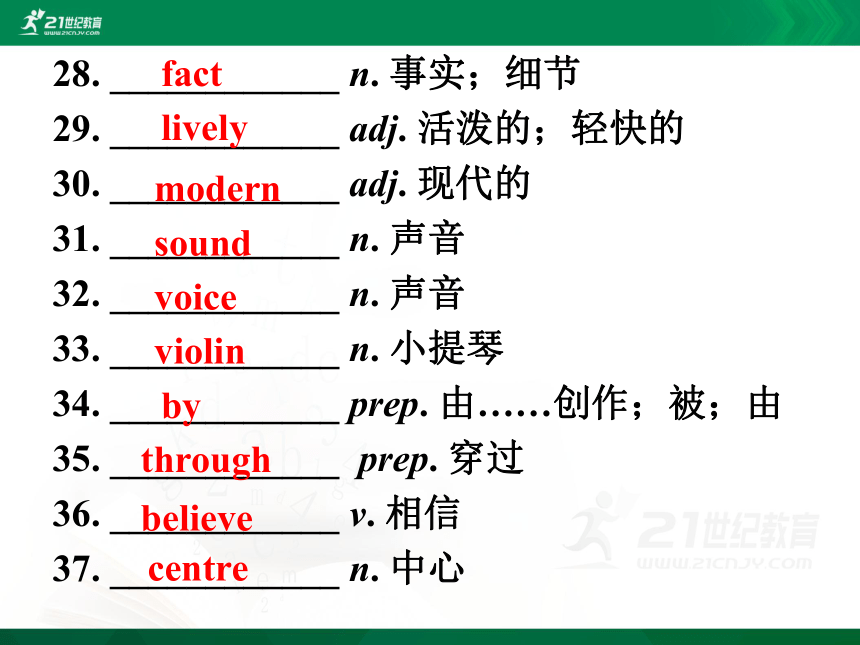
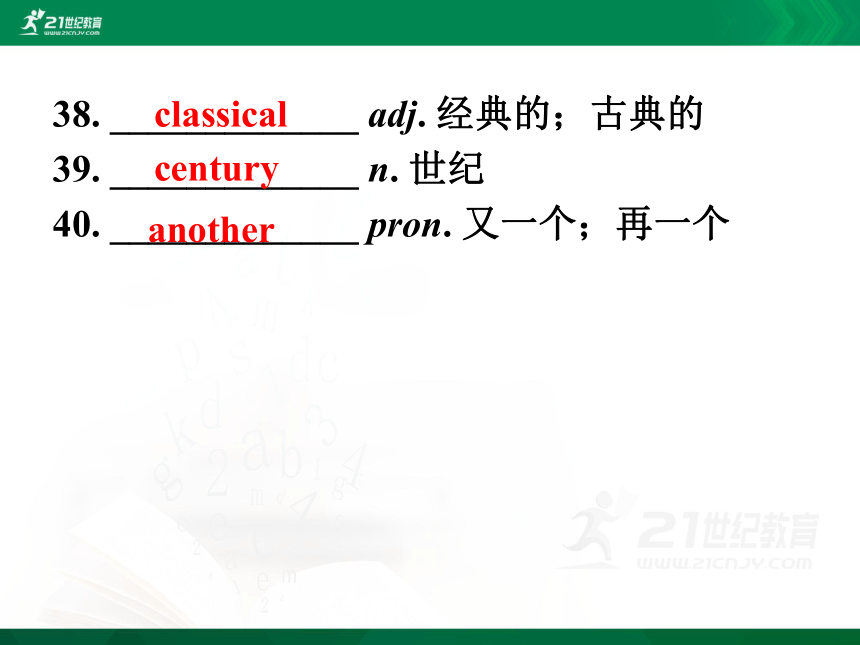
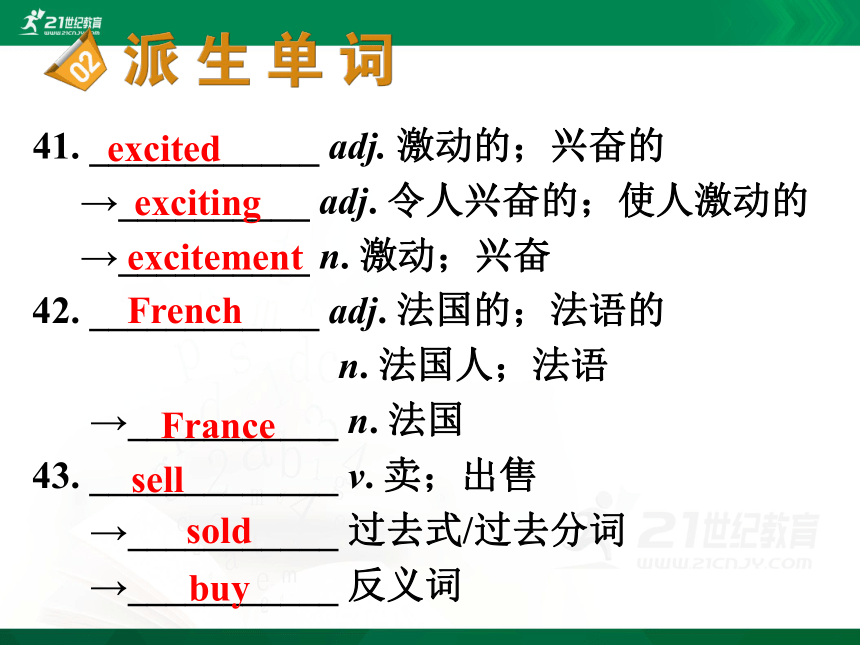
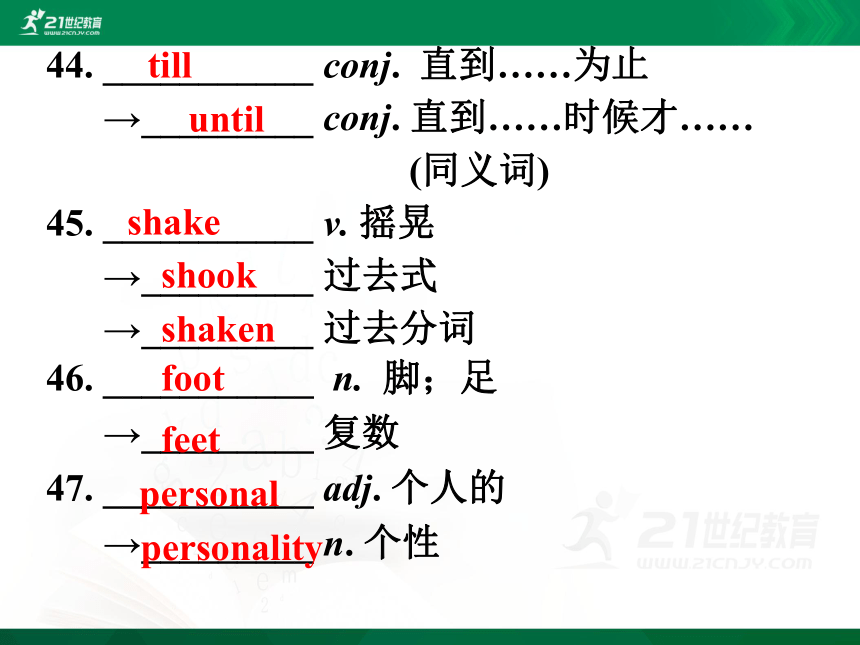
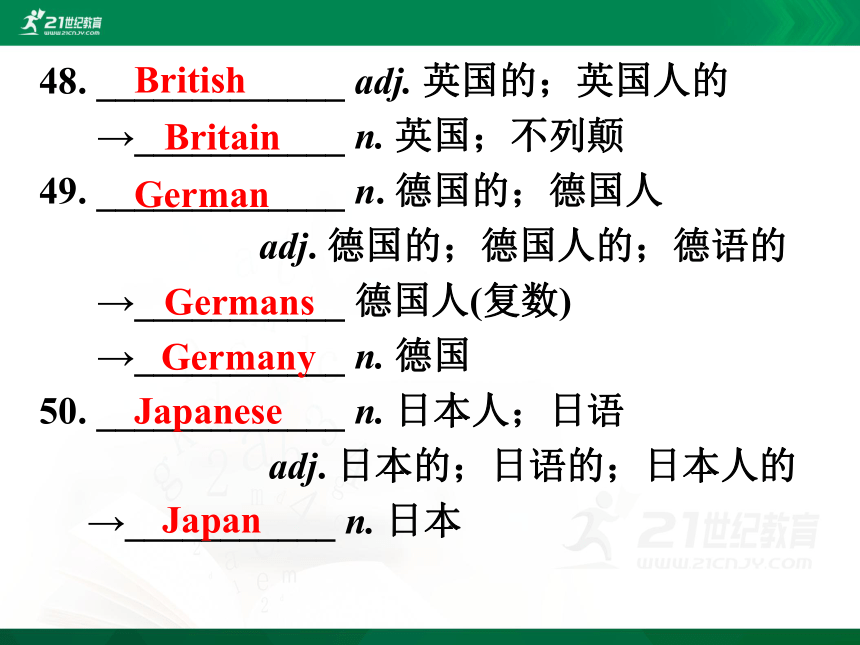
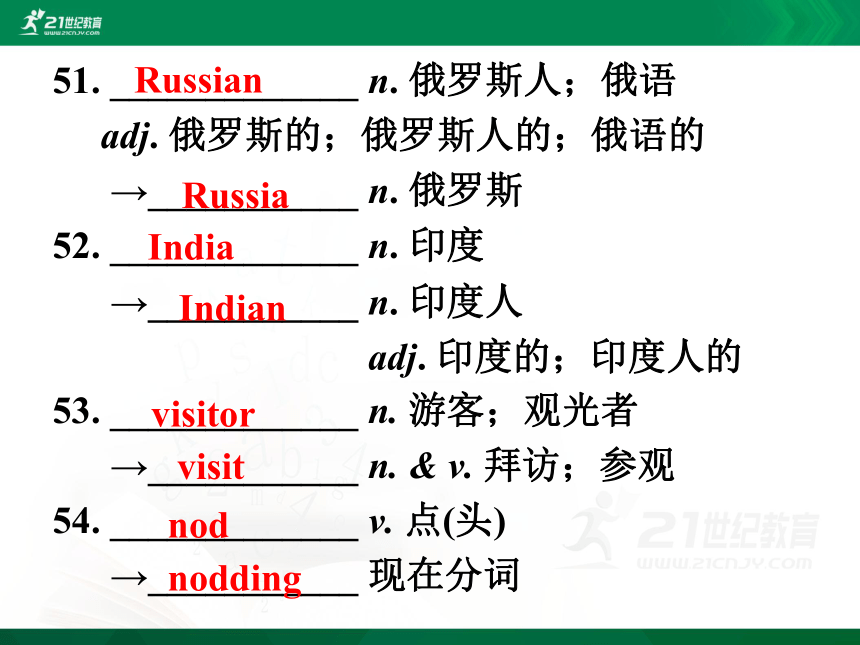
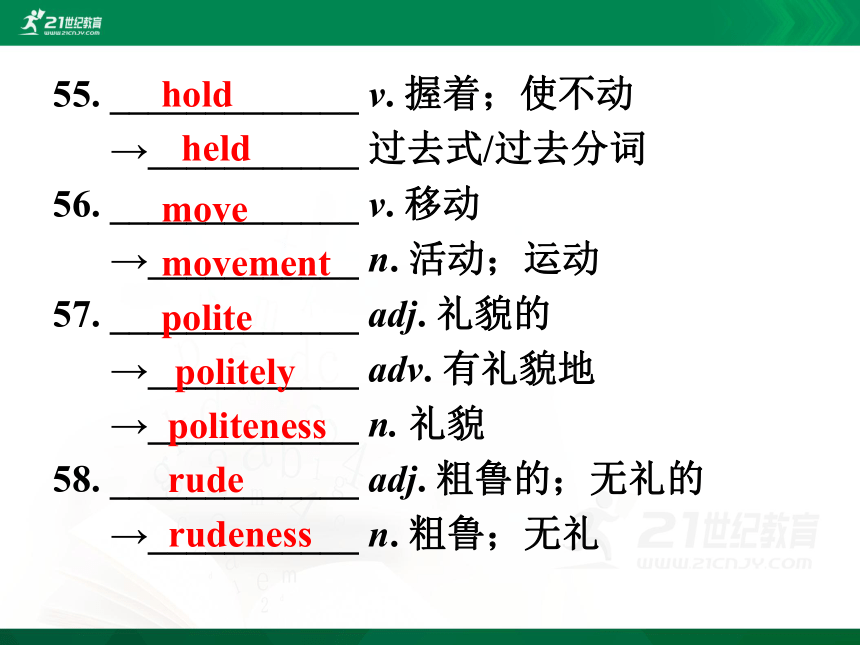
文档简介
课件101张PPT。Modules 10-12外研版七年级下册【备考2020】外研版英语中考一轮复习Part One知识清单1. ____________ adv. 那么(尤指用于引出新
话题);这么;那么(用
于强调质量、感觉或数量)
2. ____________ v. 猜;猜测
3. ____________ v. 到达
4. ____________ v. 放松
5. ____________ adj. 举世闻名的
6. ____________ n. 顶端
7. ____________ n. 电灯
soguessarriverelaxworld-famous toplight8. ____________ adv. 在使用中;开着的
9. ____________ adj. 绝妙的;了不起的
10. ___________ v. & n. 吻;亲吻
11. ___________ v. & n. 微笑
12. ___________ int. 什么(表示惊奇)
13. ___________ n. 头;头部
14. ___________ v. 拥抱;紧抱
15. ___________ pron. 各个;每个
16. ___________ adv. 一起;共同
17. ___________v. 触摸;接触
onwonderfulkisssmilewhatheadhugeachtogethertouch18. ____________ n. 鼻子
19. ____________ n. 手指
20. ____________ n. 膝盖
21. ____________ n. 腿
22. ____________ n. 嘴;口
23. ____________ n. 身体;躯体
24. ____________ n. 臂;手臂
25. ____________ adj. 外国的
26. ____________ adv. 某处;某个地方
27. ____________ v. 挥(手);招(手);摆(手)kneebodylegmouthforeignarmsomewherewavenosefinger28. ____________ n. 事实;细节
29. ____________ adj. 活泼的;轻快的
30. ____________ adj. 现代的
31. ____________ n. 声音
32. ____________ n. 声音
33. ____________ n. 小提琴
34. ____________ prep. 由……创作;被;由
35. ____________ prep. 穿过
36. ____________ v. 相信
37. ____________ n. 中心byvoicebelievesoundviolincentrethroughlivelymodernfact38. _____________ adj. 经典的;古典的
39. _____________ n. 世纪
40. _____________ pron. 又一个;再一个centuryclassicalanother41. ____________ adj. 激动的;兴奋的
→__________ adj. 令人兴奋的;使人激动的
→__________ n. 激动;兴奋excitingexcitedexcitement42. ____________ adj. 法国的;法语的
n. 法国人;法语
→___________ n. 法国
43. _____________ v. 卖;出售
→___________ 过去式/过去分词
→___________ 反义词FrenchFrancesellsoldbuy44. ___________ conj. 直到……为止
→_________ conj. 直到……时候才……
(同义词)
45. ___________ v. 摇晃
→_________ 过去式
→_________ 过去分词untiltillshakeshookshaken46. ___________ n. 脚;足
→_________ 复数
47. ___________ adj. 个人的
→_________ n. 个性footfeetpersonalpersonality48. _____________ adj. 英国的;英国人的
→___________ n. 英国;不列颠
49. _____________ n. 德国的;德国人
adj. 德国的;德国人的;德语的
→___________ 德国人(复数)
→___________ n. 德国
50. _____________ n. 日本人;日语
adj. 日本的;日语的;日本人的
→___________ n. 日本BritishBritainGermanGermanyGermansJapaneseJapan51. _____________ n. 俄罗斯人;俄语
adj. 俄罗斯的;俄罗斯人的;俄语的
→___________ n. 俄罗斯
52. _____________ n. 印度
→___________ n. 印度人
adj. 印度的;印度人的
53. _____________ n. 游客;观光者
→___________ n. & v. 拜访;参观
54. _____________ v. 点(头)
→___________ 现在分词RussianRussiaIndiaIndianvisitvisitornodnodding55. _____________ v. 握着;使不动
→___________ 过去式/过去分词
56. _____________ v. 移动
→___________ n. 活动;运动
57. _____________ adj. 礼貌的
→___________ adv. 有礼貌地
→___________ n. 礼貌
58. _____________ adj. 粗鲁的;无礼的
→___________ n. 粗鲁;无礼 holdheldmovepolitelypolitenessmovementpoliteruderudeness59. _____________ v. 带来
→___________ 过去式/过去分词
60. _____________ adj. 吵闹的
→___________ adj. 安静的 (反义词)
→___________ adv. 吵闹的
61. _____________ n. 乐手;音乐家
→___________ n. 音乐
62. _____________ adj. 欧洲的
→___________ n. 欧洲bringbroughtnoisynoisily?quiet musicianmusicEuropeanEurope63. _____________ n. 作曲家
→___________ v. 作曲
64. _____________ adj. 年长的
→___________ adj. 年老的;年长的
65. _____________ adj. 贫穷的
→___________ (反义词)
66. _____________ adj. 完美的
→___________ adv. 完美地
composercomposeelderlyelderrichperfectperfectlypoor67. ___________ adj. 令人悲伤的;令人难过的
→_________ adv. 悲伤地
→_________ n. 悲哀
→_________ (反义词)sadnesssadlysadhappy1. __________________?臂挽臂地? ? ??
2. __________________?在机场?????
3. __________________?小心????????
4. __________________?和某人在一起
5. __________________?京剧????
6. __________________?身势语?????
7. __________________?舞曲????
8. __________________?购物
9. __________________?开车带某人到……arm in arm?? ? ??
at the airport???????
be careful?????????
be with sb.??
Beijing opera?????
body language??????
dance music?????
do some shopping?
drive sb. to ...???10. ______________________?互相;彼此
11. ______________________?事实上
12. ______________________?在18世纪
13. ______________________?听???
14. ______________________ 走开
15. ______________________?北美人
16. ______________________?一点也不?
17. ______________________??度假
18. ______________________?个人空间
19. ______________________?流行音乐each other?
in fact?
in the eighteenth century???
listen to????????????????????
move away
North American?
not at all?
on holiday??
personal space?
pop music??20. ______________________?摇滚乐??????
21. ______________________?握手
22. ______________________?南美人
23. ______________________?散步
24. ______________________ ……的首都(城市)
25. ______________________?前天
26. ______________________?太平洋
27. ______________________ 西方传统音乐rock music???????
shake hands?
South American?
take a walk?
the capital (city) of ...?
the day before yesterday??
the Pacific Ocean??
traditional Western music??28. ___________________??排队等候
29. ___________________? 挥手说再见
30. ___________________??艺术品wait in line?
wave to say goodbye?
works of art??1. Where are you going on holiday ...?
2. How long did it take to get there?
3. ... guess what?
4. It was great!
5. They sell such good fruit and vegetables.
6. I hope you’ll like it!
7. We waited till all the lights were on.
8. How do I do that?
9. No, I didn’t know that.10. That’s because people do different things in different countries.
11. What do they do?
12. How about touching people?
13. In some places, it isn’t polite to look at people when you talk ...
14. ... this is Western music, isn’t it?
15. It’s so beautiful!
16. I’m not sure ...
17. What a beautiful city!18. Do you like traditional Western music or pop music ...?
19. Give us a break!
20. You don’t like rock music?
21. I don’t believe it!
22. His dance music made him famous all over?Europe.
23. Before he was six, he played not only the piano but also the violin.Part Two核心要点1. excited adj. 激动的;兴奋的excited exciting 【语境应用】
He?was?very?_______?when?he?heard?the?
_______?news.
A. exciting;?exciting??????????????
B. exciting;?excited??
C. excited;?exciting???????????????
D. excited;?excited?C get reach arrive2. arrive v. 到达【语境应用】请根据句意选用arrive, get 或
reach填空。
1) When will your uncle __________?
2) I usually ______________________ school at seven o’clock.
3) We’ll ______________________?Hong Kong?soon.
4) When do you usually _________________________ your office?arrive?get to / arrive at / reach??get to / arrive in / reachget to / arrive at / reach 3. relax v. 放松【归纳】
relax at home 在家休息
relax oneself 放松自己【拓展】
relaxed?adj.? 轻松的;随意的
(用来形容人的感受)
relaxing?adj.? 令人轻松的
(用来形容事物的特征)
relaxation?n.? 放松;娱乐;娱乐活动【语境应用】用relax, relaxing或relaxed填空。
1) They are _________ when they see the movie.
2) I like listening to _________ music.
3) Playing computer games can _________ me.
4) The TV show is very __________. All of us like watching it.relaxed?relaxingrelax?relaxing 单项选择
As soon as I heard the news that I passed the driving test, I felt _____ at once.
A. angry B. relaxed
C. afraid D. nervousB 4. French n. 法语
German adj. 德国的;德语的;德国人的
n. 德国人;德语
Russian n. 俄罗斯人;俄语
adj. 俄罗斯的;俄罗斯人的;俄语的【归纳】
Frenchman 法国人
Frenchmen 法国人(复数)
France n. 法国Germans 德国人(复数)
Germany n. 德国
Russia n. 俄罗斯
Russians n. 俄罗斯人(复数) 【拓展】
表示“某国人”的名词变复数形式一般可直接加-s。
American Americans 美国人
Australian Australians 澳大利亚人
Canadian Canadians 加拿大人以-ese结尾的表示“某国人”的名词是单复数同形。
e.g. Chinese 中国人
Japanese 日本人【语境应用】
-- Are all the students from ____ in your class?
-- No, there are only 3 ____ in our class. The others are from other countries.
A. Germany; Germen
B. Germany; Germans
C. German; Germans
D. German; Germany B 5. sell v. 卖;出售 (过去式和过去分词sold)
【拓展】反义词 buy v. 买sell可直接跟宾语,还可跟双宾语。
sell sb. sth. / sell sth. to sb.
e.g. Tom?sold?Mary his bike. / Tom?sold?his
bike to Mary.
sale是名词,常用词组有for sale (待售);on
sale (在出售;打折出售)。sell sale【语境应用】根据汉语意思完成英语句子,每空一词。
1) 你卖词典吗?
________ you ________ dictionaries?
2) 我叔叔把他的房子卖给了一个美国人。
My uncle ________ ________ ________
________ an American.
3) 售票处正在售票。
Tickets ________ ________ ________
from the booking office.Do sell sold his house
to are on sale4) 那些待售的毛衣非常漂亮。
Those sweaters ________ ________ are
very beautiful.
5) 这些短袜打折出售,才5元。
These socks are ________ ________ for
only 5 yuan.for saleon sale6. till conj. 直到……为止(时间上/程度上)【归纳】
till通常可以与until互换,但until较为正
式。
1) till用于肯定句中时,句子的谓语动词是延续性的,表示动作一直到till后的那个时间才结束;
2) till用于否定句时,句子的谓语动词是非延续性的,表示动作直到till后的那个时间才开始。 注意:until/till 还可以作介词,意为“直到……为止”,此时后跟表示时间的词或短语。
【语境应用】
Tom watched the World Cup __________ 11:30 last night.
A when B unless
C until D as soon asC7. each pron. 各个;每个each every【语境应用】根据句意用each或every填空。
1) _____________ room is clean.
2) There are many trees on _________ side of the road.
3) __________ of the boys can play soccer.?Every / Eacheach?Each 8. hold v. 握着;使不动
【归纳】hold on 坚持;不要挂断电话;
抓住,保持
hold up 举起;耽搁
hold your tongue? 住嘴;不(要)说话
hold one’s breath?屏住呼吸;极其紧张;
提心吊胆hold 短语9. lively adj. 活泼的;轻快的lively alive living【语境应用】请根据句意用lively, living或alive
填空,每词限用一次。
1) He is believed to be one of the best ________ artists.
2) Mary is such a(n) ________ girl that we all like her.
3) Mr Zhu must be ________, for he is still breathing slightly.?livinglively?alive 10. noisy adj. 吵闹的【拓展】
反义词:quiet adj. 安静的
noise n. 声音;噪音
noisily adv. 吵闹地
make (a) noise 制造噪声【语境应用】
I live in a (an) _____ neighborhood. Many people and cars come and go very often.
A. quiet B. empty C. noisy D. lonelyC11. sound n. 声音sound noise voice【语境应用】
—Mary has a sweet ________.
—Yes. She can sing very well.
A voice B sound C hearingA12. both, either, neither, all, none13. elder adj. 年长的elder older【语境应用】根据汉语意思完成英语句子,每空一词。
我姐姐比我大两岁。
My ________ sister is two years ________ than me.elder older14. another pron. 又一个;再一个another, other, the other, others 【语境应用】根据句意,选用other, the other,
others?或?another填空。
1) I have two pencil cases. One is white, ___________ is pink.
2) Do you have any ________ ideas?
3) Some people came by car, _________ came by bus. A few came on foot.
4) I lost my pen, so I bought _________ one.the otherother?othersanother 1. arm in arm ?臂挽臂地
【拓展】foot by foot 一步一步地
heart to heart 心连心
neck and neck 齐头并进
shoulder to shoulder 肩并肩
face to face 面对面
head to head 交头接耳
hand in hand 手拉手2. move away ?走开
【拓展】away相关短语 take away 拿走
run away 逃跑
get away 走开
cut away ? 切除? ?? ?
fly away 飞走?
put away 把……放好
go away? 离开 away
相关短语3. on holiday 在度假;休假 (表示一种状态,该短语中holiday前不必加冠词)【拓展】
holiday多用在英式英语中,在美式英语中,表示“假期”要用vacation。on vacation 意为“在度假;休假”。
【语境应用】
Are those people here __________ vacation?
A in B on C at D withB1. How long did it take to get there?
How long 引导的特殊疑问句,时态是一般过去时,该句的结构是“How long did + 主语 + 动词原形 + 其他?”,how long 意为“多长时间”,对时间段进行提问。how long, how often, how soon【语境应用】
-- How long does it _____ to get to the
station by taxi?
-- About an hour.
A. use B. have C. take D. spendC2. It has many world-famous works of art, such as the Mona Lisa.
such as 例如
用来列举同类人或事物中的几个例子,通常以词或短语的形式举例。
for example 例如
通常以某事为例,以句子的形式进行列举;作插入语时,用逗号与其他句子成分隔开,可置于句首、句中或句末。3. That’s because people do different things in different countries.
That’s because… 那是因为……
后接表示原因的句子。
that’s why 那是为什么 ……
后接表示结果的句子。
e.g. That’s because I didn’t know about it.
That’s why he came late.4. His dance music made him famous all over Europe.
make sb. / sth. do sth.
让某人/物做某事
make sb. / sth. + adj. 使某人/物……
e.g. The music made us relaxed.
The boss made him work for 12 hours.Part Three语法要点祈使句 (Module 11)
祈使句常用来表示请求、命令、劝告、号召、禁止等。肯定式
1.?以动词原形开头。此类祈使句的主语一般是第二人称you,但往往省略,句末通常用句号或感叹号。如:
Stand up. Be quiet, please!
2.?以let’s开头。如:
Let’s go now.否定式
1. Don’t+动词原形。如:
Don’t swim in this river.
2. Let’s + not+动词原形。如:
Let’s not say anything about it.温馨提示:
◆“No+动词-ing形式?/?可数名词的复数形式”可表示“禁止做某事”。如:
No smoking!
No photos!
◆“祈使句+and / or+分句”结构中,祈使句具有条件句的含义。如:
Push the door hard(,) and it will open.
=If you push the door hard, it will open.感叹句 (Module 12)
感叹句是用来表达喜、怒、哀、乐等强烈情感的句子。到目前为止,我们学习的感叹句有两类:
第一类就是陈述句句末加感叹号表示强烈的语气;
第二类是由what或how引导。下面重点复习第二类。what引导的感叹句的常见结构如下:
1. What+a/an+形容词+可数名词单数形式(+主语+谓语)!?如:
What a clever boy (Kim is)!
What an honest man (he is)!
2. What+形容词+可数名词复数形式(+主语+谓语)!?如:
What big apples (they are)!
3. What+形容词+不可数名词(+主语+谓语)!?如:
What fine weather (it is)!how引导的感叹句的常见结构如下:
How+形容词?/?副词(+主语+谓语)!?如:
How important (the information is)!
How fast (he runs)!
温馨提示:一般情况下,由what和how引导的感叹句可以相互转换,转换后意义不变。如:
What a beautiful city it is! = How beautiful the city is!祈使句1. _______ noise pollution, and we can live in a quiet environment. (2019四川眉山)
A. Prevent B. Preventing
C. Prevented D. To prevent
2. _______ on the grass. It’s a rule of the park.
(2019青海)
A. Step B. Don’t step C. To stepAB3. Please ______ here earlier!We don’t want
to miss the last bus to the library.
(2018 吉林)
A. arrive B to arrive C. arriving
4. Life is like a journey. ________ ahead, and
you will see a lot more beautiful sceneries
(风景). (2018 贵州黔南)
A. Plan B. To plan C. Planning D. PlansAA5. ______ to turn off all the lights when you go
out.
(2018 湖南湘潭)
A. Remember B. To remember
C. Remembering
6. Please ______ the rubbish into different
litter bins according to the signs.
(2018 上海中考)
A. puts B. put C. putting D. to putAB感叹句1. _______ special classes we had! We have learned a lot about paper cutting.
(2019山东青岛)
A. What B. What C. How a D. How
2. —_______ wonderful the music is! What’s its
name?
—Victory. (2019江苏宿迁)
A. How B. How a C. What D. What a B A3. _______ lucky they are, I thought, to have
each other. (2019 湖南株洲)
A. What a B. What C. How
4. _______ useful advice you gave us!
(2019青海)
A. What B. What a C. HowC A 5. —My sister is planning to have a second
child next year.
—________ good idea it is!
(2018 江苏淮安)
A. What B. What a C. How D. How a
6. --The temperature is only 10℃ today.
--Yes. _______ strange the weather is in
Urumqi this year!
(2018 新疆乌鲁木齐)
A. How B. How a C. What D. What aBAPart Four交际用语一、提醒注意 (Reminding)
1. Don’t stand too close to North
Americans!
2. Give them more personal space.
3. No smoking!
4. Be careful!
5. Don’t touch!
6. It’s dangerous!二、肯定和不肯定(Certainty and uncertainty)
1. I’m sure.
2. I’m sure of that.
3. I’m (quite) sure (that) she’ll join us.
4. I’m not sure.
5. I’m not sure of that.
6. I’m not sure whether / if she can come.
7. Maybe you’re right.
8. Perhaps she is at home now.三、高兴(Happiness)
1. How wonderful / nice!
2. That’s lovely / great / wonderful!
3. I’m so happy.
四、满意(Satisfaction)
1. Good!
2. Well done!
3. Perfect!
4. That’s fine!
5. That’s better.根据对话内容从方框中选择能填入空白处的最佳选项补全对话,其中有两项多余。A: Hi, Qin Gang. How was your summer
holiday?
B: It was great!A. It was boring.
B. What about you??
C. Where did you go??
D. Why did you go there?
E. What did you do there??
F. I met some friends there.
G. What was the weather like there?A: (1)_______
B: I went to Beihai.
A: (2)_______
B: It was sunny and warm.
A: Sounds good. (3)_______A. It was boring.
B. What about you??
C. Where did you go??
D. Why did you go there?
E. What did you do there??
F. I met some friends there.
G. What was the weather like there?CGEB: I played on the beach and swam in the sea.
(4)______
A: I stayed at home.
B: What do you think of your holiday?
A: (5)_______ I had to study all the time.A. It was boring.
B. What about you??
C. Where did you go??
D. Why did you go there?
E. What did you do there??
F. I met some friends there.
G. What was the weather like there?BA Part Five话题写作旅游与交通——旅行【写作任务】(改编自2018湖南长沙书面表达)
假如你是李华,于4月13日星期五这一天参加了学校组织的郊游活动。请你以school trip为主题,写一则英文日记,内容包括参加活动的人员、集合时间、郊游地点、交通方式、活动内容以及个人感受等。
要求:
1. 80词左右(开头已给出,不计入总词数);
2.?可适当增加细节,以使行文连贯;
3.?日记中不得出现真实的人名和校名。【思路点拨】
1.?定基调
体裁:记叙文
时态:一般过去时
人称:以第一人称为主
2.?谋布局、写句子we were given a warm welcomeWe took lots of picturesIt was time for us to leave3.?巧衔接
(1)?为了使文章衔接更紧密,On the farm ...与上句衔接时可以使用where引导的定语从句,During the picnic ...与上句衔接时可以使用which引导的定语从句。
(2)?当上下句有转折关系时,可以用though / although来连接,使文章更加流畅和自然。4.?成篇章
??????????????????????????????????????????????????Friday,?April?13th
It was sunny today. We went on a school trip.?We visited the Greenery Farm and it was great fun.
All of our classmates met at the school gate at 7:00 a.m., and went to the farm by bus. On arriving there, we were given a warm welcome by the farmers. Then one of the workers showed us around the farm, where we learned a lot about farming. At noon, we had a picnic, during which we enjoyed ourselves in the sunshine, singing, dancing and flying kites. We did love the fresh air and the beauty of nature. We took lots of pictures.
Time flew! It was time for us to leave though we didn't want to. It was really an unforgettable and meaningful trip for us.5.?化“平凡”为“非凡”
It was really an unforgettable and meaningful trip for us.
→What an unforgettable and meaningful trip we had!Part Six巩固练习1. Shenzhen is a very ________(现代的) city.
2. Shall we go to the park ________(一起) this Sunday?
3. You look so tired. You should stop working to ________(放松).
4. They were ________(激动的) when they heard the good news.?Ⅰ.?根据语境及所给汉语提示语写出所缺单词。relaxtogetherexcitedmodern1. My aunt is a singer and she has a sweet v________.
2. This coat is too big for me. May I try on a________ one?
3. Travelling by train is much s________ than travelling by plane, but it's much cheaper.
4. I'm too bored here. Let's go s_________ to have fun.? Ⅱ.?根据语境及所给首字母提示补全所缺单词。somewhereanothervoiceslower?根据汉语意思完成英语句子,每空一词(含缩略形式)。
1.?你不喜欢这块手表?
You ________ ________ this watch?
2.?多么有趣的一部电影啊!
________ ________ ________ movie!
3.?你喜欢物理还是化学?
________ ________ ________ physics ________ chemistry?
4.?他不但擅长篮球,也擅长足球。
He is good at ________ ________ basketball ________ ________ football.don't like?What an interesting?Do you like
or not only
but also?1. My father is a doctor and my mother is a doctor too.? (改为同义句)
________ ________ my parents are doctors.
2. Did you get to?Beijing?this morning?? (改为同义句)
Did you ________ ________?Beijing?this morning??根据括号内的要求完成下列各题,每空一词。Both of?arrive in3. Mrs Wang went to the park?by bus?yesterday. ?(对划线部分提问)
________ ________ Mrs Wang ________ to the park yesterday?
4. They ran?in the playground?yesterday evening. (对划线部分提问)
________ ________ they ________ yesterday evening?How did go?Where did run 阅读短文,从方框中选择恰当的单词并用其适当形式填空,使短文通顺,意思完整,每词限用一次。problem, both, good, read, from, advice, close, new, accept, become Last night I looked through a magazine article named “Healthy Chocolate?”. After (1)_______ the article, I got to know more about the benefits (益处) of the chocolate.
I used to think eating chocolate can only worsen our health and make us (2)_______ fatter and fatter. readingbecomeproblem, both, good, read, from, advice, close, new, accept, becomeThe article gives me a(n) (3)_______ understanding that eating chocolate actually makes our body healthier. This is really very good news for me and my sister as (4)_______ of us love eating chocolate since we were small. Also, (5)_______ the article I know that chocolate is medically proven (被证明) to be an effective excitant (有效的兴奋剂). That's true! When I feel sad, I usually eat some chocolate and then I will feel much (6)_______.new?bothfrombetter?problem, both, good, read, from, advice, close, new, accept, become According to what the article says, milk chocolate has very few benefits. The main (7)_______ is that I do not really like dark chocolate although it should be the healthiest kind of chocolate. My sister is “luckier” as she (8)_______ every kind of chocolate. I think maybe it's time for me to listen to the (9)_______ and change my choice from milk chocolate to dark chocolate.problemacceptsadvice?problem, both, good, read, from, advice, close, new, accept, become In a word, this article is really a useful piece of work as it (10)_______ relates to (与……相关) our daily lives. ?closely谢谢21世纪教育网(www.21cnjy.com) 中小学教育资源网站 有大把高质量资料?一线教师?一线教研员?
欢迎加入21世纪教育网教师合作团队!!月薪过万不是梦!!
详情请看:
https://www.21cnjy.com/help/help_extract.php
话题);这么;那么(用
于强调质量、感觉或数量)
2. ____________ v. 猜;猜测
3. ____________ v. 到达
4. ____________ v. 放松
5. ____________ adj. 举世闻名的
6. ____________ n. 顶端
7. ____________ n. 电灯
soguessarriverelaxworld-famous toplight8. ____________ adv. 在使用中;开着的
9. ____________ adj. 绝妙的;了不起的
10. ___________ v. & n. 吻;亲吻
11. ___________ v. & n. 微笑
12. ___________ int. 什么(表示惊奇)
13. ___________ n. 头;头部
14. ___________ v. 拥抱;紧抱
15. ___________ pron. 各个;每个
16. ___________ adv. 一起;共同
17. ___________v. 触摸;接触
onwonderfulkisssmilewhatheadhugeachtogethertouch18. ____________ n. 鼻子
19. ____________ n. 手指
20. ____________ n. 膝盖
21. ____________ n. 腿
22. ____________ n. 嘴;口
23. ____________ n. 身体;躯体
24. ____________ n. 臂;手臂
25. ____________ adj. 外国的
26. ____________ adv. 某处;某个地方
27. ____________ v. 挥(手);招(手);摆(手)kneebodylegmouthforeignarmsomewherewavenosefinger28. ____________ n. 事实;细节
29. ____________ adj. 活泼的;轻快的
30. ____________ adj. 现代的
31. ____________ n. 声音
32. ____________ n. 声音
33. ____________ n. 小提琴
34. ____________ prep. 由……创作;被;由
35. ____________ prep. 穿过
36. ____________ v. 相信
37. ____________ n. 中心byvoicebelievesoundviolincentrethroughlivelymodernfact38. _____________ adj. 经典的;古典的
39. _____________ n. 世纪
40. _____________ pron. 又一个;再一个centuryclassicalanother41. ____________ adj. 激动的;兴奋的
→__________ adj. 令人兴奋的;使人激动的
→__________ n. 激动;兴奋excitingexcitedexcitement42. ____________ adj. 法国的;法语的
n. 法国人;法语
→___________ n. 法国
43. _____________ v. 卖;出售
→___________ 过去式/过去分词
→___________ 反义词FrenchFrancesellsoldbuy44. ___________ conj. 直到……为止
→_________ conj. 直到……时候才……
(同义词)
45. ___________ v. 摇晃
→_________ 过去式
→_________ 过去分词untiltillshakeshookshaken46. ___________ n. 脚;足
→_________ 复数
47. ___________ adj. 个人的
→_________ n. 个性footfeetpersonalpersonality48. _____________ adj. 英国的;英国人的
→___________ n. 英国;不列颠
49. _____________ n. 德国的;德国人
adj. 德国的;德国人的;德语的
→___________ 德国人(复数)
→___________ n. 德国
50. _____________ n. 日本人;日语
adj. 日本的;日语的;日本人的
→___________ n. 日本BritishBritainGermanGermanyGermansJapaneseJapan51. _____________ n. 俄罗斯人;俄语
adj. 俄罗斯的;俄罗斯人的;俄语的
→___________ n. 俄罗斯
52. _____________ n. 印度
→___________ n. 印度人
adj. 印度的;印度人的
53. _____________ n. 游客;观光者
→___________ n. & v. 拜访;参观
54. _____________ v. 点(头)
→___________ 现在分词RussianRussiaIndiaIndianvisitvisitornodnodding55. _____________ v. 握着;使不动
→___________ 过去式/过去分词
56. _____________ v. 移动
→___________ n. 活动;运动
57. _____________ adj. 礼貌的
→___________ adv. 有礼貌地
→___________ n. 礼貌
58. _____________ adj. 粗鲁的;无礼的
→___________ n. 粗鲁;无礼 holdheldmovepolitelypolitenessmovementpoliteruderudeness59. _____________ v. 带来
→___________ 过去式/过去分词
60. _____________ adj. 吵闹的
→___________ adj. 安静的 (反义词)
→___________ adv. 吵闹的
61. _____________ n. 乐手;音乐家
→___________ n. 音乐
62. _____________ adj. 欧洲的
→___________ n. 欧洲bringbroughtnoisynoisily?quiet musicianmusicEuropeanEurope63. _____________ n. 作曲家
→___________ v. 作曲
64. _____________ adj. 年长的
→___________ adj. 年老的;年长的
65. _____________ adj. 贫穷的
→___________ (反义词)
66. _____________ adj. 完美的
→___________ adv. 完美地
composercomposeelderlyelderrichperfectperfectlypoor67. ___________ adj. 令人悲伤的;令人难过的
→_________ adv. 悲伤地
→_________ n. 悲哀
→_________ (反义词)sadnesssadlysadhappy1. __________________?臂挽臂地? ? ??
2. __________________?在机场?????
3. __________________?小心????????
4. __________________?和某人在一起
5. __________________?京剧????
6. __________________?身势语?????
7. __________________?舞曲????
8. __________________?购物
9. __________________?开车带某人到……arm in arm?? ? ??
at the airport???????
be careful?????????
be with sb.??
Beijing opera?????
body language??????
dance music?????
do some shopping?
drive sb. to ...???10. ______________________?互相;彼此
11. ______________________?事实上
12. ______________________?在18世纪
13. ______________________?听???
14. ______________________ 走开
15. ______________________?北美人
16. ______________________?一点也不?
17. ______________________??度假
18. ______________________?个人空间
19. ______________________?流行音乐each other?
in fact?
in the eighteenth century???
listen to????????????????????
move away
North American?
not at all?
on holiday??
personal space?
pop music??20. ______________________?摇滚乐??????
21. ______________________?握手
22. ______________________?南美人
23. ______________________?散步
24. ______________________ ……的首都(城市)
25. ______________________?前天
26. ______________________?太平洋
27. ______________________ 西方传统音乐rock music???????
shake hands?
South American?
take a walk?
the capital (city) of ...?
the day before yesterday??
the Pacific Ocean??
traditional Western music??28. ___________________??排队等候
29. ___________________? 挥手说再见
30. ___________________??艺术品wait in line?
wave to say goodbye?
works of art??1. Where are you going on holiday ...?
2. How long did it take to get there?
3. ... guess what?
4. It was great!
5. They sell such good fruit and vegetables.
6. I hope you’ll like it!
7. We waited till all the lights were on.
8. How do I do that?
9. No, I didn’t know that.10. That’s because people do different things in different countries.
11. What do they do?
12. How about touching people?
13. In some places, it isn’t polite to look at people when you talk ...
14. ... this is Western music, isn’t it?
15. It’s so beautiful!
16. I’m not sure ...
17. What a beautiful city!18. Do you like traditional Western music or pop music ...?
19. Give us a break!
20. You don’t like rock music?
21. I don’t believe it!
22. His dance music made him famous all over?Europe.
23. Before he was six, he played not only the piano but also the violin.Part Two核心要点1. excited adj. 激动的;兴奋的excited exciting 【语境应用】
He?was?very?_______?when?he?heard?the?
_______?news.
A. exciting;?exciting??????????????
B. exciting;?excited??
C. excited;?exciting???????????????
D. excited;?excited?C get reach arrive2. arrive v. 到达【语境应用】请根据句意选用arrive, get 或
reach填空。
1) When will your uncle __________?
2) I usually ______________________ school at seven o’clock.
3) We’ll ______________________?Hong Kong?soon.
4) When do you usually _________________________ your office?arrive?get to / arrive at / reach??get to / arrive in / reachget to / arrive at / reach 3. relax v. 放松【归纳】
relax at home 在家休息
relax oneself 放松自己【拓展】
relaxed?adj.? 轻松的;随意的
(用来形容人的感受)
relaxing?adj.? 令人轻松的
(用来形容事物的特征)
relaxation?n.? 放松;娱乐;娱乐活动【语境应用】用relax, relaxing或relaxed填空。
1) They are _________ when they see the movie.
2) I like listening to _________ music.
3) Playing computer games can _________ me.
4) The TV show is very __________. All of us like watching it.relaxed?relaxingrelax?relaxing 单项选择
As soon as I heard the news that I passed the driving test, I felt _____ at once.
A. angry B. relaxed
C. afraid D. nervousB 4. French n. 法语
German adj. 德国的;德语的;德国人的
n. 德国人;德语
Russian n. 俄罗斯人;俄语
adj. 俄罗斯的;俄罗斯人的;俄语的【归纳】
Frenchman 法国人
Frenchmen 法国人(复数)
France n. 法国Germans 德国人(复数)
Germany n. 德国
Russia n. 俄罗斯
Russians n. 俄罗斯人(复数) 【拓展】
表示“某国人”的名词变复数形式一般可直接加-s。
American Americans 美国人
Australian Australians 澳大利亚人
Canadian Canadians 加拿大人以-ese结尾的表示“某国人”的名词是单复数同形。
e.g. Chinese 中国人
Japanese 日本人【语境应用】
-- Are all the students from ____ in your class?
-- No, there are only 3 ____ in our class. The others are from other countries.
A. Germany; Germen
B. Germany; Germans
C. German; Germans
D. German; Germany B 5. sell v. 卖;出售 (过去式和过去分词sold)
【拓展】反义词 buy v. 买sell可直接跟宾语,还可跟双宾语。
sell sb. sth. / sell sth. to sb.
e.g. Tom?sold?Mary his bike. / Tom?sold?his
bike to Mary.
sale是名词,常用词组有for sale (待售);on
sale (在出售;打折出售)。sell sale【语境应用】根据汉语意思完成英语句子,每空一词。
1) 你卖词典吗?
________ you ________ dictionaries?
2) 我叔叔把他的房子卖给了一个美国人。
My uncle ________ ________ ________
________ an American.
3) 售票处正在售票。
Tickets ________ ________ ________
from the booking office.Do sell sold his house
to are on sale4) 那些待售的毛衣非常漂亮。
Those sweaters ________ ________ are
very beautiful.
5) 这些短袜打折出售,才5元。
These socks are ________ ________ for
only 5 yuan.for saleon sale6. till conj. 直到……为止(时间上/程度上)【归纳】
till通常可以与until互换,但until较为正
式。
1) till用于肯定句中时,句子的谓语动词是延续性的,表示动作一直到till后的那个时间才结束;
2) till用于否定句时,句子的谓语动词是非延续性的,表示动作直到till后的那个时间才开始。 注意:until/till 还可以作介词,意为“直到……为止”,此时后跟表示时间的词或短语。
【语境应用】
Tom watched the World Cup __________ 11:30 last night.
A when B unless
C until D as soon asC7. each pron. 各个;每个each every【语境应用】根据句意用each或every填空。
1) _____________ room is clean.
2) There are many trees on _________ side of the road.
3) __________ of the boys can play soccer.?Every / Eacheach?Each 8. hold v. 握着;使不动
【归纳】hold on 坚持;不要挂断电话;
抓住,保持
hold up 举起;耽搁
hold your tongue? 住嘴;不(要)说话
hold one’s breath?屏住呼吸;极其紧张;
提心吊胆hold 短语9. lively adj. 活泼的;轻快的lively alive living【语境应用】请根据句意用lively, living或alive
填空,每词限用一次。
1) He is believed to be one of the best ________ artists.
2) Mary is such a(n) ________ girl that we all like her.
3) Mr Zhu must be ________, for he is still breathing slightly.?livinglively?alive 10. noisy adj. 吵闹的【拓展】
反义词:quiet adj. 安静的
noise n. 声音;噪音
noisily adv. 吵闹地
make (a) noise 制造噪声【语境应用】
I live in a (an) _____ neighborhood. Many people and cars come and go very often.
A. quiet B. empty C. noisy D. lonelyC11. sound n. 声音sound noise voice【语境应用】
—Mary has a sweet ________.
—Yes. She can sing very well.
A voice B sound C hearingA12. both, either, neither, all, none13. elder adj. 年长的elder older【语境应用】根据汉语意思完成英语句子,每空一词。
我姐姐比我大两岁。
My ________ sister is two years ________ than me.elder older14. another pron. 又一个;再一个another, other, the other, others 【语境应用】根据句意,选用other, the other,
others?或?another填空。
1) I have two pencil cases. One is white, ___________ is pink.
2) Do you have any ________ ideas?
3) Some people came by car, _________ came by bus. A few came on foot.
4) I lost my pen, so I bought _________ one.the otherother?othersanother 1. arm in arm ?臂挽臂地
【拓展】foot by foot 一步一步地
heart to heart 心连心
neck and neck 齐头并进
shoulder to shoulder 肩并肩
face to face 面对面
head to head 交头接耳
hand in hand 手拉手2. move away ?走开
【拓展】away相关短语 take away 拿走
run away 逃跑
get away 走开
cut away ? 切除? ?? ?
fly away 飞走?
put away 把……放好
go away? 离开 away
相关短语3. on holiday 在度假;休假 (表示一种状态,该短语中holiday前不必加冠词)【拓展】
holiday多用在英式英语中,在美式英语中,表示“假期”要用vacation。on vacation 意为“在度假;休假”。
【语境应用】
Are those people here __________ vacation?
A in B on C at D withB1. How long did it take to get there?
How long 引导的特殊疑问句,时态是一般过去时,该句的结构是“How long did + 主语 + 动词原形 + 其他?”,how long 意为“多长时间”,对时间段进行提问。how long, how often, how soon【语境应用】
-- How long does it _____ to get to the
station by taxi?
-- About an hour.
A. use B. have C. take D. spendC2. It has many world-famous works of art, such as the Mona Lisa.
such as 例如
用来列举同类人或事物中的几个例子,通常以词或短语的形式举例。
for example 例如
通常以某事为例,以句子的形式进行列举;作插入语时,用逗号与其他句子成分隔开,可置于句首、句中或句末。3. That’s because people do different things in different countries.
That’s because… 那是因为……
后接表示原因的句子。
that’s why 那是为什么 ……
后接表示结果的句子。
e.g. That’s because I didn’t know about it.
That’s why he came late.4. His dance music made him famous all over Europe.
make sb. / sth. do sth.
让某人/物做某事
make sb. / sth. + adj. 使某人/物……
e.g. The music made us relaxed.
The boss made him work for 12 hours.Part Three语法要点祈使句 (Module 11)
祈使句常用来表示请求、命令、劝告、号召、禁止等。肯定式
1.?以动词原形开头。此类祈使句的主语一般是第二人称you,但往往省略,句末通常用句号或感叹号。如:
Stand up. Be quiet, please!
2.?以let’s开头。如:
Let’s go now.否定式
1. Don’t+动词原形。如:
Don’t swim in this river.
2. Let’s + not+动词原形。如:
Let’s not say anything about it.温馨提示:
◆“No+动词-ing形式?/?可数名词的复数形式”可表示“禁止做某事”。如:
No smoking!
No photos!
◆“祈使句+and / or+分句”结构中,祈使句具有条件句的含义。如:
Push the door hard(,) and it will open.
=If you push the door hard, it will open.感叹句 (Module 12)
感叹句是用来表达喜、怒、哀、乐等强烈情感的句子。到目前为止,我们学习的感叹句有两类:
第一类就是陈述句句末加感叹号表示强烈的语气;
第二类是由what或how引导。下面重点复习第二类。what引导的感叹句的常见结构如下:
1. What+a/an+形容词+可数名词单数形式(+主语+谓语)!?如:
What a clever boy (Kim is)!
What an honest man (he is)!
2. What+形容词+可数名词复数形式(+主语+谓语)!?如:
What big apples (they are)!
3. What+形容词+不可数名词(+主语+谓语)!?如:
What fine weather (it is)!how引导的感叹句的常见结构如下:
How+形容词?/?副词(+主语+谓语)!?如:
How important (the information is)!
How fast (he runs)!
温馨提示:一般情况下,由what和how引导的感叹句可以相互转换,转换后意义不变。如:
What a beautiful city it is! = How beautiful the city is!祈使句1. _______ noise pollution, and we can live in a quiet environment. (2019四川眉山)
A. Prevent B. Preventing
C. Prevented D. To prevent
2. _______ on the grass. It’s a rule of the park.
(2019青海)
A. Step B. Don’t step C. To stepAB3. Please ______ here earlier!We don’t want
to miss the last bus to the library.
(2018 吉林)
A. arrive B to arrive C. arriving
4. Life is like a journey. ________ ahead, and
you will see a lot more beautiful sceneries
(风景). (2018 贵州黔南)
A. Plan B. To plan C. Planning D. PlansAA5. ______ to turn off all the lights when you go
out.
(2018 湖南湘潭)
A. Remember B. To remember
C. Remembering
6. Please ______ the rubbish into different
litter bins according to the signs.
(2018 上海中考)
A. puts B. put C. putting D. to putAB感叹句1. _______ special classes we had! We have learned a lot about paper cutting.
(2019山东青岛)
A. What B. What C. How a D. How
2. —_______ wonderful the music is! What’s its
name?
—Victory. (2019江苏宿迁)
A. How B. How a C. What D. What a B A3. _______ lucky they are, I thought, to have
each other. (2019 湖南株洲)
A. What a B. What C. How
4. _______ useful advice you gave us!
(2019青海)
A. What B. What a C. HowC A 5. —My sister is planning to have a second
child next year.
—________ good idea it is!
(2018 江苏淮安)
A. What B. What a C. How D. How a
6. --The temperature is only 10℃ today.
--Yes. _______ strange the weather is in
Urumqi this year!
(2018 新疆乌鲁木齐)
A. How B. How a C. What D. What aBAPart Four交际用语一、提醒注意 (Reminding)
1. Don’t stand too close to North
Americans!
2. Give them more personal space.
3. No smoking!
4. Be careful!
5. Don’t touch!
6. It’s dangerous!二、肯定和不肯定(Certainty and uncertainty)
1. I’m sure.
2. I’m sure of that.
3. I’m (quite) sure (that) she’ll join us.
4. I’m not sure.
5. I’m not sure of that.
6. I’m not sure whether / if she can come.
7. Maybe you’re right.
8. Perhaps she is at home now.三、高兴(Happiness)
1. How wonderful / nice!
2. That’s lovely / great / wonderful!
3. I’m so happy.
四、满意(Satisfaction)
1. Good!
2. Well done!
3. Perfect!
4. That’s fine!
5. That’s better.根据对话内容从方框中选择能填入空白处的最佳选项补全对话,其中有两项多余。A: Hi, Qin Gang. How was your summer
holiday?
B: It was great!A. It was boring.
B. What about you??
C. Where did you go??
D. Why did you go there?
E. What did you do there??
F. I met some friends there.
G. What was the weather like there?A: (1)_______
B: I went to Beihai.
A: (2)_______
B: It was sunny and warm.
A: Sounds good. (3)_______A. It was boring.
B. What about you??
C. Where did you go??
D. Why did you go there?
E. What did you do there??
F. I met some friends there.
G. What was the weather like there?CGEB: I played on the beach and swam in the sea.
(4)______
A: I stayed at home.
B: What do you think of your holiday?
A: (5)_______ I had to study all the time.A. It was boring.
B. What about you??
C. Where did you go??
D. Why did you go there?
E. What did you do there??
F. I met some friends there.
G. What was the weather like there?BA Part Five话题写作旅游与交通——旅行【写作任务】(改编自2018湖南长沙书面表达)
假如你是李华,于4月13日星期五这一天参加了学校组织的郊游活动。请你以school trip为主题,写一则英文日记,内容包括参加活动的人员、集合时间、郊游地点、交通方式、活动内容以及个人感受等。
要求:
1. 80词左右(开头已给出,不计入总词数);
2.?可适当增加细节,以使行文连贯;
3.?日记中不得出现真实的人名和校名。【思路点拨】
1.?定基调
体裁:记叙文
时态:一般过去时
人称:以第一人称为主
2.?谋布局、写句子we were given a warm welcomeWe took lots of picturesIt was time for us to leave3.?巧衔接
(1)?为了使文章衔接更紧密,On the farm ...与上句衔接时可以使用where引导的定语从句,During the picnic ...与上句衔接时可以使用which引导的定语从句。
(2)?当上下句有转折关系时,可以用though / although来连接,使文章更加流畅和自然。4.?成篇章
??????????????????????????????????????????????????Friday,?April?13th
It was sunny today. We went on a school trip.?We visited the Greenery Farm and it was great fun.
All of our classmates met at the school gate at 7:00 a.m., and went to the farm by bus. On arriving there, we were given a warm welcome by the farmers. Then one of the workers showed us around the farm, where we learned a lot about farming. At noon, we had a picnic, during which we enjoyed ourselves in the sunshine, singing, dancing and flying kites. We did love the fresh air and the beauty of nature. We took lots of pictures.
Time flew! It was time for us to leave though we didn't want to. It was really an unforgettable and meaningful trip for us.5.?化“平凡”为“非凡”
It was really an unforgettable and meaningful trip for us.
→What an unforgettable and meaningful trip we had!Part Six巩固练习1. Shenzhen is a very ________(现代的) city.
2. Shall we go to the park ________(一起) this Sunday?
3. You look so tired. You should stop working to ________(放松).
4. They were ________(激动的) when they heard the good news.?Ⅰ.?根据语境及所给汉语提示语写出所缺单词。relaxtogetherexcitedmodern1. My aunt is a singer and she has a sweet v________.
2. This coat is too big for me. May I try on a________ one?
3. Travelling by train is much s________ than travelling by plane, but it's much cheaper.
4. I'm too bored here. Let's go s_________ to have fun.? Ⅱ.?根据语境及所给首字母提示补全所缺单词。somewhereanothervoiceslower?根据汉语意思完成英语句子,每空一词(含缩略形式)。
1.?你不喜欢这块手表?
You ________ ________ this watch?
2.?多么有趣的一部电影啊!
________ ________ ________ movie!
3.?你喜欢物理还是化学?
________ ________ ________ physics ________ chemistry?
4.?他不但擅长篮球,也擅长足球。
He is good at ________ ________ basketball ________ ________ football.don't like?What an interesting?Do you like
or not only
but also?1. My father is a doctor and my mother is a doctor too.? (改为同义句)
________ ________ my parents are doctors.
2. Did you get to?Beijing?this morning?? (改为同义句)
Did you ________ ________?Beijing?this morning??根据括号内的要求完成下列各题,每空一词。Both of?arrive in3. Mrs Wang went to the park?by bus?yesterday. ?(对划线部分提问)
________ ________ Mrs Wang ________ to the park yesterday?
4. They ran?in the playground?yesterday evening. (对划线部分提问)
________ ________ they ________ yesterday evening?How did go?Where did run 阅读短文,从方框中选择恰当的单词并用其适当形式填空,使短文通顺,意思完整,每词限用一次。problem, both, good, read, from, advice, close, new, accept, become Last night I looked through a magazine article named “Healthy Chocolate?”. After (1)_______ the article, I got to know more about the benefits (益处) of the chocolate.
I used to think eating chocolate can only worsen our health and make us (2)_______ fatter and fatter. readingbecomeproblem, both, good, read, from, advice, close, new, accept, becomeThe article gives me a(n) (3)_______ understanding that eating chocolate actually makes our body healthier. This is really very good news for me and my sister as (4)_______ of us love eating chocolate since we were small. Also, (5)_______ the article I know that chocolate is medically proven (被证明) to be an effective excitant (有效的兴奋剂). That's true! When I feel sad, I usually eat some chocolate and then I will feel much (6)_______.new?bothfrombetter?problem, both, good, read, from, advice, close, new, accept, become According to what the article says, milk chocolate has very few benefits. The main (7)_______ is that I do not really like dark chocolate although it should be the healthiest kind of chocolate. My sister is “luckier” as she (8)_______ every kind of chocolate. I think maybe it's time for me to listen to the (9)_______ and change my choice from milk chocolate to dark chocolate.problemacceptsadvice?problem, both, good, read, from, advice, close, new, accept, become In a word, this article is really a useful piece of work as it (10)_______ relates to (与……相关) our daily lives. ?closely谢谢21世纪教育网(www.21cnjy.com) 中小学教育资源网站 有大把高质量资料?一线教师?一线教研员?
欢迎加入21世纪教育网教师合作团队!!月薪过万不是梦!!
详情请看:
https://www.21cnjy.com/help/help_extract.php
